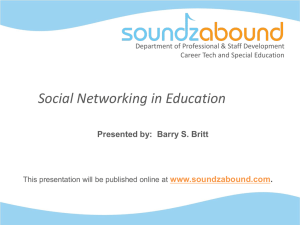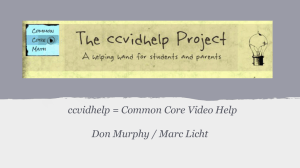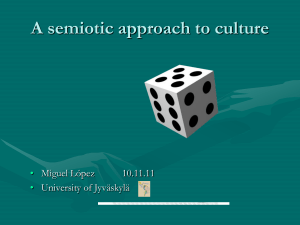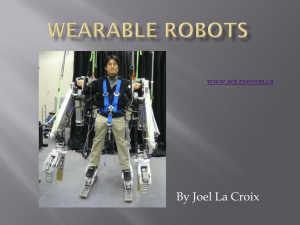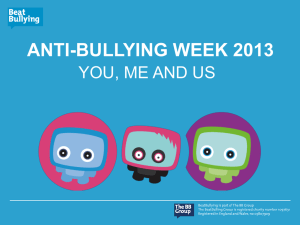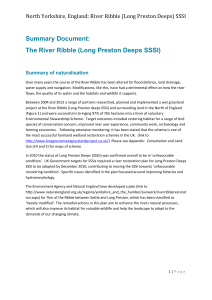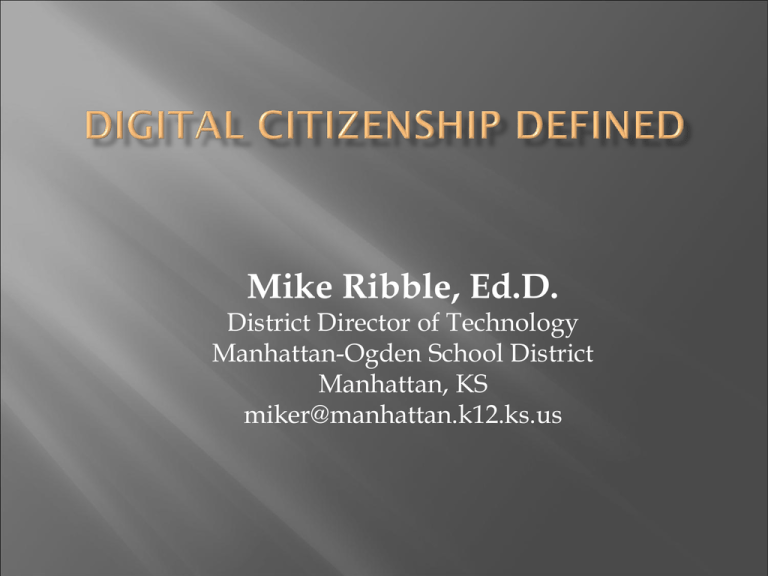
Mike Ribble, Ed.D.
District Director of Technology
Manhattan-Ogden School District
Manhattan, KS
miker@manhattan.k12.ks.us
Do we still feel the same about others and their
technology use? Do we think about ours?
Do we try to do too much at one time (multitasking)?
Are we sharing more information than we
should (Facebook, Twitter, etc.)?
Where will be in another five years?
Child Exploitation and Online Protection Center
Video http://www.youtube.com/watch?v=4ovR3FF
_6us
Several
Recommendations
by Subcommittees –
From the Internet Safety
Education two
recommendations were:
promote instruction in
digital media literacy and
computer security pre-K12 and promote digital
citizenship in pre-K-12
education as a national
priority.
Newer Research – Pew Internet and Life Project
http://www.pewinternet.org/
How is it defined?
What are the major tenants?
What are the skills to be taught?
When/Where will we teach?
http://www.jasonohler.com/index.cfm
“what it means to be a citizen in the
Digital Age”
Cable in the Classroom
Digital Citizenship is a holistic and positive approach to helping children learn how
to be safe and secure, as well as smart and effective participants in a digital
world. That means helping them understand their rights and responsibilities,
recognize the benefits and risks, and realize the personal and ethical implications
of their actions.
http://www.youtube.com/watch?v=i8c9EAqNFC4
YouTube Videos – Digital
Citizen
http://www.youtube.com/watch?v=ihTfqGcxd-E
http://www.youtube.com/watch?v=lrIcn5Fo9q8&feature=related
Mike Ribble, Ed.D.
District Director of Technology
Manhattan-Ogden School District
Manhattan, KS
miker@manhattan.k12.ks.us
Will Gardner of Childnet in London referred to
three components of digital citizenship:
participation and access (by and for youth) and
collaboration (of users, industry, government,
schools and parents).
Cable in the Classrooms skill areas:
Safety & Security
Digital Literacy
Ethics & Community
Minnesota Statute: 609.352 SOLICITATION OF CHILDREN TO ENGAGE IN
SEXUAL CONDUCT; COMMUNICATION OF SEXUALLY EXPLICIT MATERIALS
TO CHILDREN.
(https://www.revisor.mn.gov/statutes/?id=609&view=chapter&year=2010&key
word_type=all&keyword=sex#stat.609.283)
Subd. 2a.Electronic solicitation of children.
A person 18 years of age or older who uses the Internet, a computer, computer program, computer network,
computer system, an electronic communications system, or a telecommunications, wire, or radio
communications system, or other electronic device capable of electronic data storage or transmission to commit
any of the following acts, with the intent to arouse the sexual desire of any person, is guilty of a felony and may
be sentenced as provided in subdivision 4:
(1) soliciting a child or someone the person reasonably believes is a child to engage in sexual conduct;
(2) engaging in communication with a child or someone the person reasonably believes is a child, relating to or
describing sexual conduct; or
(3) distributing any material, language, or communication, including a photographic or video image, that relates
to or describes sexual conduct to a child or someone the person reasonably believes is a child.
Subd. 4.Penalty.
A person convicted under subdivision 2 or 2a is guilty of a felony and may be sentenced to imprisonment for
not more than three years, or to payment of a fine of not more than $5,000, or both.
http://g-mag.net/abdo/
http://www.youtube.com/watch?v=9izAFkt6
Uew
http://www.youtube.com/watch?v=5wsBX37
yR3Y
It is often brought up by students (and other
users) that if we have the ability we should be
able to use resources?
Does this hold true in other parts of our lives?
Should our “Digital Citizenship” be any
different than our country citizenship?
Let’s take a look at some ideas/issues.
SIMILARITIES
Both deal with one
person taking attacking
another psychologically.
Students can deal with
both through
intervention.
Both can continue after
school as well.
DIFFERENCES
Technology can make
people feel anonymous.
Technology can involve
a larger number of
people.
Regular bullying can
have a physical aspect
as well.
CANDY BAR
Laws against
shoplifting
Causes loss of revenue
store
We typically teach our
children/students it is
not appropriate.
DOWNLOADING SONGS
Laws against
downloading – but
many opportunities.
Can decrease revenue
for companies.
We don’t always state
to children/students
that it is wrong.
DRINKING
Alcohol Addiction
Physical Issues
Loss of Attention
Can Lead to Accidents
Laws Against Doing
TEXTING
Technology Addiction
Can Have Physical
Issues
Loss of Attention
Can Lead to Accidents
New Laws Being Passed
http://www.schooltube.com/video/4386d84344
d2a7345c5e/ATT-The-Last-Text-Documentary
Mike Ribble, Ed.D.
District Director of Technology
Manhattan-Ogden School District
Manhattan, KS
miker@manhattan.k12.ks.us
We work out to keep our body and mind
healthy…
Now its time to work on our digital health!!
http://www.youtube.com/watch?v=UHiBhp
mGd4E
R
Respect Yourself and Others
E
Educate Yourself and Others
P
Protect Yourself and Others
Digital Access: full electronic participation
in society.
Digital Law: the legal rights and
restrictions governing technology use.
Digital Communication: electronic
exchange of information.
Digital Literacy: the capability to use
digital technology and knowing when
and how to use it.
Digital Commerce: the buying and
selling of goods online.
Digital Rights and Responsibilities: the
privileges and freedoms extended to all
digital technology users, and the behavioral
expectations that come with them
Digital Security (self-protection): the
precautions that all technology users must
take to guarantee their personal safety
and the security of their network.
Digital Health and Welfare: the elements of
physical and psychological well-being
related to digital technology use.
Kindergarten - 2nd
Digital Manners (Etiquette)
Digital Communication
Digital Rights and Responsibilities
Reinforce Topics
3rd – 5th
Digital Access
Digital Literacy (Education)
Digital Safety (Security)
Reinforce Topics
6th – 8th Grades
Digital Law
Digital Commerce
Digital Health and Welfare
Reinforce topics
Now you can focus your 9-12 graders on applying
concepts they should have covered K-8
Is it Schools?
Is it Home?
Is it Society?
http://www.youtube.com/watch?v=N4uc1iVxLxU
How will you use this information from this
seminar?
How soon will you begin?
Who needs to be involved?
What needs to be covered?
Where do you start?
1st – Identify your greatest needs.
2nd – What is your timeline?
3rd – Who needs more information, training,
staff development?
4th – Who will lead this process?
5th – What projects, programs processes will
you do?
6th – How do we get started?
Give a short report.
Ask questions.
Provide support and encouragement.
Find ways to work together.
As a technological society it is our responsibility
to provide all users the opportunity to work,
interact, and use technology without the
interference, destruction, or obstruction by the
actions of inappropriate users. As digital
citizens we pledge to help create a society of
users that strive to use technology
appropriately. We will work with others to
identify the needs of technology users and
provide opportunities to make them effective.
What Questions Do You Have?


